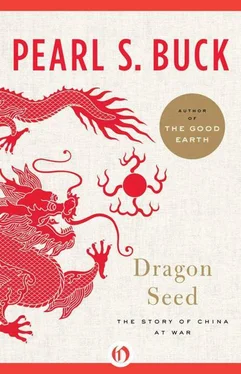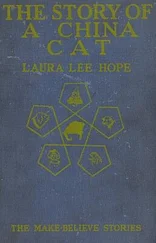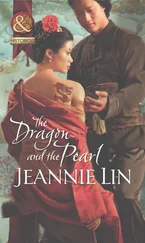The idea of reading set her to laughing behind the hand she always put in front of her face when she laughed because her teeth were black.
“I never thought of it,” she said. But when she saw her city husband look at her with impatience on his fat face she took her hand away and made herself grave and considered what he had asked.
“When I was a child in the village,” she said, “I used to hear the old one-eyed man who told stories tell about certain robbers who lived near a lake. When he told them, every one, man or woman or child, they all leaned forward to hear what would come next and when he paused at some point where a man lay caught in a trap or a battle was about to be fought and passed his basket for pennies, they rained into it like hail on a ripe rice field.”
Wu Lien looked at her proudly.
“You have hit on exactly the right book,” he said. “That is the one, my brother,” he said. “It has everything in it, and all the women who deceive their husbands are punished and the righteous prevail. It is a naughty book sometimes, but the naughty ones are always punished and go down in battle before the others. The name of the book is Shui Hu Chuan, and it is full of righteous robbers. Yes, I read that book when I was a small boy and I could read it again.”
He began to pull his fat underlip, smiling as he did so, and remembering the pleasure he had once had in the book. Lao Er rose and repeated the name of the book and thanked them and bade them good-bye and was making his way through the shop, now crowded with many customers, when he was stopped by the sound of quarreling voices. These voices shouted so loud and so suddenly that everybody stopped buying and turned their heads toward the wide door of the shop. Lao Er found himself held there by an army of young men with rocks and sticks in their hands.
In front of them was their leader, a tall young man who wore no hat and his long hair fell over his eyes. He brushed it away and shouted at a clerk to open a case. When the clerk delayed, he took up the rock in his hand and crashed it through the glass of the locked case.
“Enemy goods!” he cried in a high voice.
He put in both his hands and lifted out watches and pens and trinkets and threw them into the street, and the moment he did this all the young men rushed in and began to break the cases and to throw out the goods, and a great groan went up from the customers at such waste of good stuff, though there were some who seized what they could get and made off with it, and as fast as the stuff was thrown into the streets, the people there fell upon it. When the young men saw this they were twice as angry as before and they rushed out and beat the people with their sticks and cracked their heads with the rocks they held until the people fell back. Then some of the young men stood guard over the goods that the others threw out and set fire to them, and shirts and coats and blankets and knitted goods and hats and shoes went into the fire. All around the blaze the crowd stood, their hungry eyes fixed in horror upon such waste but no one dared to say a word. Lao Er stood there, his mouth hanging open at all he saw, but he, too, did not dare to say a word. His brother-in-law did not come nor was there any sign of a clerk left now in the shop, and who was he, one man, to speak if these did not? He watched until his heart was sickened and he went away.
He was halfway to the city gate before he remembered that he had forgotten to buy his book, and so he turned back to the street of booksellers and went to the table next to the little bitter man and asked for the book. The bookseller tossed it to him, a thick old book dirtied with many who had read it.
“A dirty book like this must be cheap,” Lao Er said, looking at the spots of grease and black.
“So it might have been a few days ago,” the bookseller said, “but in the past few days many of the students have come to buy this book who never read it before. Ask me why and I have no answer. I do not know why they do anything, those young ones. They are like drunk men and as for the women—” He spat on the stone on which he stood and rubbed it with his foot.
“What is the price?” Lao Er asked.
“Three silver small pieces,” the bookseller replied.
Lao Er stared in horror.
“For a book?” he shouted.
“Why not for a book?” the old man retorted. “You spend as much on a piece of pig’s meat and you eat it and it is gone and what is left is waste. But a book you put into your mind and there it lies and you can read it over when you forget it and think of it longer and out of it who knows what you will think? You might think yourself to fortune.”
So Lao Er reached into his girdle and took out the money and paid it, and then was angry because the old man next who had been watching all this time smiled sourly and said,
“If you knew the name of a book why did you not speak it? I have that book.” And he took it up, clean and whole, from his table.
In spite of his anger Lao Er could only go on, saying as he went, though he wished he had the clean one, “I had rather have the dirty one from him than a clean one from you after this morning, you turtle’s egg,” and so he went homeward.
And yet he had not left that street before he thought he ought to go and see his sister’s husband’s shop again and how they did and if the ruffians had gone or not. So he wound his way there once more and when he reached the place the shop was boarded up and only a heap of ashes lay in the street. A few beggars and children searched these ashes for buttons and bits of metal but the people came and went about their business as though they had seen this sight many times before.
He stood asking himself whether or not he should go in and see whether the ones within were well or not, but before he did so it came to him that he ought first to think of his own parents and their distress if he should be tangled in this trouble, and the more especially did he hesitate because upon the boards there were scrawled in white chalk some great fierce-looking letters. He stared at the letters a long time but nothing came from them to his mind, and at last he turned to an elderly, learned-looking man in a long black robe who happened at that moment to be passing.
“Sir, will you tell me what these letters say?” he asked.
The man paused and put on his horn-rimmed spectacles that he drew out of his bosom pocket and pursed his lips and read the words a few times to himself. Then he said:
“These letters say that what has happened to this house shall happen to every like house that sells enemy goods, and if it is not enough, life itself will be taken from those who sell or buy enemy goods.”
“Sir, thank you,” Lao Er said in alarm. The words were as fierce as they looked, and he knew that in duty to his parents he ought to leave this spot at once and hasten to the safety of his own home, and in no way let it be known that he had any kinship to this house. This he did, and under his arm he held the book for Jade, wrapped up in the strip of blue cotton which he wore otherwise around his neck to wipe the sweat from his face if he were hot. These were strange days, he thought to himself, when in a morning one could see what he had seen. He made haste to leave the city where such things could happen and he hurried home and he was glad for the peace of the fields and the clear calm sky.
When he came home he gave the book to Jade, but even the book was forgotten today in what he had to tell them all. There in the courtyard they all listened to him and Pansiao, his youngest sister, stopped her loom and came out too to hear. When he had heard all, Ling Tan drew on his water pipe a while. Then he spoke.
“Did you ask what was the name of this enemy?”
Читать дальше












